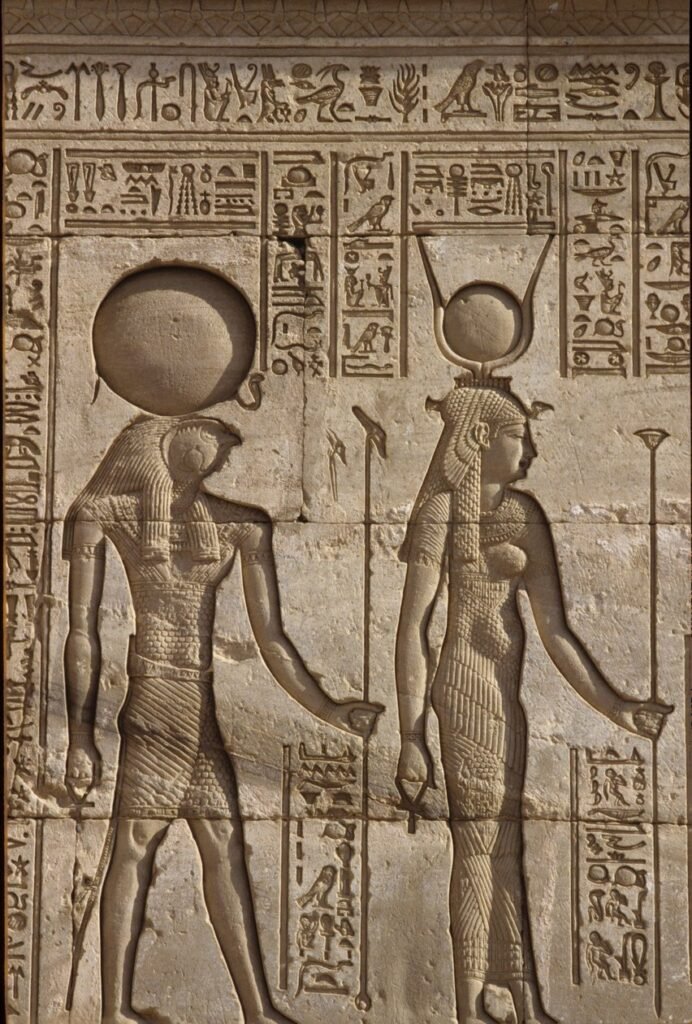Table of Contents
ToggleEgyptian Mythology: Gods and Goddesses Shaping Ancient Life

Introduction to the Gods of Ancient Egypt
Religion as the Foundation of Ancient Egyptian Life
Egyptian mythology is rich with stories, symbols, and gods that shaped the daily life and spiritual beliefs of the ancient Egyptians. These gods and goddesses played a central role in Egyptian culture and religion, influencing art, literature, and architecture.
Role of Gods in Nature, Politics, and the Afterlife
Deities weren’t just worshipped—they governed every element of the universe, from the rising of the sun to the fate of the soul after death. Temples, rituals, and myths expressed their divine order and reinforced the pharaoh’s connection to them.
Top 10 Egyptian Gods and Their Meanings
Ra – The Sun God and Creator of Life
Ra, the sun god, was one of the most powerful and widely worshipped gods in ancient Egypt.
Symbolism: Often depicted with a sun disk on his head, symbolizing light, warmth, and life.
Mythology: Seen as the creator god who made the sun rise every morning and journey through the underworld every night.
Worship: Temples dedicated to Ra were built throughout the land, and he was often associated with other gods like Amun and Horus.
⚖️Osiris – God of the Underworld and Resurrection
Osiris was the god of the underworld and rebirth, playing a central role in beliefs about life after death.
Symbolism: Often shown as a mummified man wearing a white crown and holding a crook and flail.
Mythology: Famous for his death and resurrection — killed by his brother Seth and brought back by his wife Isis.
Worship: Considered the judge of the dead, with followers hoping for eternal life through him.
Isis – Goddess of Magic, Healing, and Motherhood
Isis was one of the most beloved goddesses in ancient Egypt.
Symbolism: Depicted with a throne or sun disk on her head and often holding baby Horus.
Mythology: A powerful sorceress who revived Osiris and raised Horus.
Worship: Revered not only locally but across the Mediterranean world.
🦅 Horus – God of the Sky and Kingship
Horus was a major deity tied to royal power.
Symbolism: Shown as a falcon or a man with a falcon head.
Mythology: Son of Osiris and Isis, he battled his uncle Seth to reclaim his father’s throne.
Worship: Seen as the divine protector of the pharaohs.
⚰️ Anubis – Guardian of the Dead
Anubis was essential to funerary rites.
Symbolism: Shown as a jackal or jackal-headed man.
Mythology: Overseer of embalming and guide of souls to the afterlife.
Worship: Honored during mummification; priests often wore his mask during rituals.
🧠Thoth – God of Wisdom and Writing
Thoth played a crucial intellectual and spiritual role.
Symbolism: Depicted as an ibis or man with ibis head, with writing tools.
Mythology: Inventor of hieroglyphics, god of time, language, and records.
Worship: Patron of scribes, priests, and scholars.
🐱Bastet – Goddess of Home, Fertility, and Cats
Symbolism: Shown as a lioness or domestic cat.
Mythology: Known for her protective and nurturing qualities.
Worship: Especially revered in the city of Bubastis.
🌊Sobek – God of the Nile and Crocodiles
Symbolism: Crocodile or man with crocodile head.
Mythology: Associated with fertility and military prowess.
Worship: Temples along the Nile honored him for protection and strength.
🌌 Nut – Sky Goddess and Mother of the Stars
Symbolism: A woman arching over the sky, covered in stars.
Mythology: Swallowed the sun each night and gave birth to it each morning.
Worship: Connected with the cycle of day and night.
🌾Geb – God of the Earth
Symbolism: Green-skinned man lying beneath Nut.
Mythology: Gave rise to plants and animals; father of snakes.
Worship: Associated with fertility and earthquakes.
Conclusion – Divine Order in Ancient Egyptian Belief
How These Gods Influenced Everyday Life
The deities influenced daily rituals, family roles, leadership, agriculture, and even medicine. People prayed for protection, justice, fertility, and guidance.
Legacy of Egyptian Mythology in Modern Culture
Today, these gods inspire books, films, museums, and academic studies. Their stories reflect humanity’s eternal search for meaning, order, and connection with the divine.

